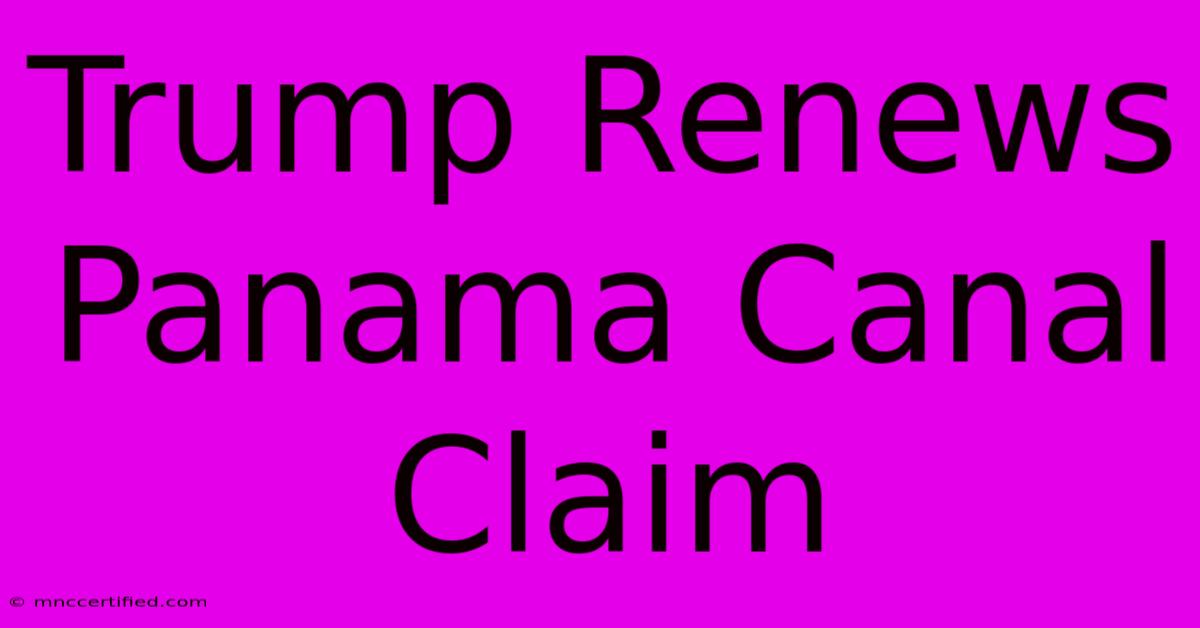Trump Renews Panama Canal Claim

Table of Contents
Trump Renews Panama Canal Claim: A Reawakened Dispute?
The recent resurgence of Donald Trump's comments regarding the Panama Canal has reignited a debate surrounding the historical context, current geopolitical implications, and the potential for future conflict. While the specifics of his claims remain somewhat vague, the very mention of revisiting this issue raises crucial questions about international law, treaty obligations, and the delicate balance of power in the region. This article delves into the intricacies of Trump's renewed assertion, examining its potential impact on US-Panama relations and the broader global landscape.
Understanding the Historical Context: The Panama Canal Treaty
The Panama Canal's history is fraught with complex political and diplomatic maneuvers. The United States played a pivotal role in its construction and subsequent operation, a legacy that continues to shape the current dynamic. The Torrijos-Carter Treaties of 1977 marked a significant turning point, transferring control of the Canal Zone to Panama. This transfer, completed in 1999, established Panama's sovereignty over the waterway, a momentous occasion for the nation. However, the legacy of US involvement, including infrastructure and operational expertise, remains deeply intertwined with the canal's continued success.
Trump's Statements and Their Interpretation
Trump's statements lack specific details, making accurate interpretation challenging. However, his rhetoric often suggests a reconsideration of the 1977 treaties, implying a potential challenge to Panama's sovereignty or at least a renegotiation of existing agreements. This ambiguity creates uncertainty, prompting anxieties among policymakers and international relations experts. The lack of clarity necessitates further investigation into the precise nature of his proposed changes.
Geopolitical Ramifications: A Shifting Global Landscape
The Panama Canal's strategic importance cannot be overstated. It serves as a crucial shipping route connecting the Atlantic and Pacific oceans, impacting global trade and influencing international relations. Any attempt to alter the existing framework governing the canal could destabilize the region and trigger unforeseen consequences. This highlights the crucial role of diplomacy and international cooperation in maintaining peace and stability.
Economic Implications: Trade and Global Commerce
Disrupting the established norms governing the Panama Canal would have significant economic repercussions. The canal's efficiency directly impacts global trade, transportation costs, and ultimately, the global economy. Uncertainty regarding its future governance would negatively affect investor confidence, leading to potentially substantial economic losses. The canal's smooth operation is vital for global commerce and any perceived threat to that operation has far-reaching consequences.
Legal Considerations: International Law and Treaty Obligations
International law holds significant weight in resolving such disputes. The 1977 treaties, ratified by both the US and Panama, represent a binding legal agreement. Any attempt to disregard these treaties would have serious legal implications and could damage US credibility on the international stage. Understanding the legal framework is essential in analyzing the feasibility and potential consequences of Trump's claims.
Potential for Conflict and Diplomatic Solutions
The potential for conflict arising from Trump's renewed claims is a serious concern. Open communication and diplomatic engagement are crucial to de-escalate tensions and find mutually acceptable solutions. Ignoring the established legal and diplomatic processes risks exacerbating the situation and potentially harming US-Panama relations. A commitment to dialogue and peaceful negotiation remains essential.
Conclusion: The Path Forward
The Panama Canal remains a vital artery of global trade and a symbol of Panamanian sovereignty. Trump's renewed claims, while vague, underscore the need for clear and consistent communication on US foreign policy regarding this critical waterway. Maintaining open dialogue, respecting international law, and prioritizing diplomatic solutions are crucial steps in navigating this potentially volatile situation. The future of the Panama Canal and the stability of the region depend on responsible leadership and a commitment to peaceful coexistence. Further research into the specifics of Trump's assertions and the official responses from Panama and the US government is necessary to provide a more complete understanding of this evolving situation.
Keywords: Panama Canal, Trump, Panama Canal Treaty, Torrijos-Carter Treaties, International Law, Geopolitics, Global Trade, US-Panama Relations, Diplomatic Relations, Sovereignty, International Relations, Economic Implications, Treaty Obligations.

Thank you for visiting our website wich cover about Trump Renews Panama Canal Claim. We hope the information provided has been useful to you. Feel free to contact us if you have any questions or need further assistance. See you next time and dont miss to bookmark.
Featured Posts
-
Panama Canal Trumps New Threat
Dec 24, 2024
-
Honda And Nissan A 2026 Merger
Dec 24, 2024
-
Christopher Nolans Next Film A Mythic Epic
Dec 24, 2024
-
Bells For Children A Christmas Eve Remembrance
Dec 24, 2024
-
Squid Game Returns Netflixs Season 2
Dec 24, 2024